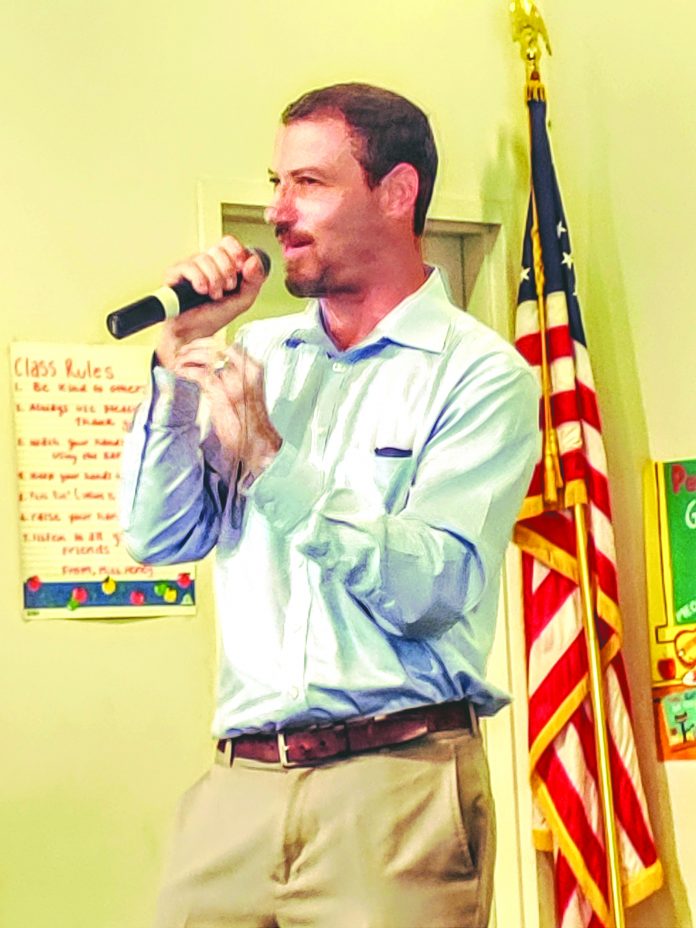By David N. Young
The City of Long Beach is rapidly becoming a leader in developing resources and methods to deal with the country’s growing homelessness crisis, an adviser to Long Beach Robert Garcia and the administrator of the 1st Council District said on Sunday.
“We get it here in Long Beach and the rest of the country is recognizing it,” said Daniel Brezenoff in an address before a packed house at the Grace First Presbyterian Church, near Los Alamitos and Cypress.
During his address, Brezenoff tried to dispel many notions about “the homeless” widely enjoyed by the public that he said empirical data does not support. The “misinformation breeds hostility” about the homeless, he said.
For instance, Brezenoff noted that while many in the public have a fear of crime from the homeless, there is ample evidence that those living on the streets will more likely be the victims of crime rather than perpetrate them.
Homeless people sleep during the day, he said, because many stay up most of the night because they are themselves in fear that they will be harmed or robbed, he said.
Also, he said despite the belief that many of the homeless are simply lazy and looking for a handout, there is ample data to prove that most of them are homeless because of economic issues, which he said are getting worse, not better.
According to Brezenoff, mental health plays a huge role in feeding the homelessness crisis, yet most people don’t realize that it takes a mental health patient 17 or 18 tries before navigating the vast governmental bureaucracy before getting help, said Brezenoff. Sadly, he said, many give up before getting help and end up on the streets.
There are a myriad of root causes for homelessness, said Brezenoff, including systemic reasons that are never seen by the public. Thousands of homeless, he said, simply “age-out” of the state’s foster care system and they too, become homeless.
Despite the growing crisis, he said, collaboration and innovation within the city of Long Beach was beginning to make a difference.
Among the many innovations, he said, was the affordable housing development entitled the “Villages at Cabrillo.” The innovative development brings people from all over the country to tour it and concepts like “bridge housing” are now being implemented by the city.
Brezenoff, who is a 25-year mental health professional, said Long Beach has also unveiled the Starview mental health clinic, which is an urgent care type facility to treat mental health problems around the clock.
In addition to the 24-hour mental health urgent care facility, Brezenoff said Long Beach fire and police departments have been embedded with mental health training and they have created a mental health emergency team.
The city is working on “inclusionary zoning” and “harm reducation models,” and he said understanding the true nature of homelessless will help everyone cope with the ongoing crisis. Brezenoff said the city already provides assistance in some capacity to more than 13,000 homeless each year.
“As much as we’re struggling, we’re in a lot better shape than other cities,” said Brezenoff. Asked why it appears as though the city is making no progress, Brezenoff said “we are bailing the boat, but we have to find a way to stop the rain.”
Brezenoff, who currently is the Administrator of the 1st Council District while the city elects a Council member to replace Lena Gonzalez (who was elected in a special election to the California State Senate), said “as bad as Long Beach looks, it doesn’t look like Skid row.”
Brezenoff said afterwards he does not know what impact the city of Long Beach’s efforts is having on nearby areas of Los Alamitos, Cypress or Seal Beach, saying “what I do know is that we’re (Long Beach) is doing our part.”
Jonas Hayes, a spokesman for the church, said Brezenoff was the first in a series of “lunch and learn” speakers wherein “people of faith can address the social issues of our times.”
Photo by David N. Young
Daniel Brezenoff addresses the homelessness crisis before a large group at Grace First Presbyterian Church on Sunday.

